#israel and palestine 2023
Text

Image Credit: PlayStation
The Not So Hidden Israeli Politics of 'The Last of Us Part II'
A past Israeli wrote this 2020 article and got into how The Last of Us: Part II to "both sides" its story into a fatalist, status-quo-preserving ideology that nevertheless supports Israeli/Zionist actions in the Mid East by revealing the Israeli military infrastructure AND its stereotypes/racist mindset towards Palestinians. It also mentions the twisting of Judaism, the Holocaust, and how Israelis view themselves.
The article (all of this is the entire thing, not mine!):
The real horror in zombie fiction is usually not the legions of undead, but the frailties and cruelties that they expose in the living. The differences between stories in the genre come from the specific fears and frustrations that they render into their metaphors. The Last of Us Part II fits perfectly within these genre conventions, but what's different here is its sources of inspiration.
The Last of Us Part II focuses on what has been broadly defined by some of its creators as a "cycle of violence." While some zombie fiction shows human depravity in response to fear or scarcity in the immediate aftermath of an outbreak, The Last of Us Part II takes place in a more stabilized post apocalypse, decades after societal collapse, where individuals and communities choose to hurt each other as opposed to taking heinous actions out of desperation.
More specifically, the cycle of violence in The Last of Us Part II appears to be largely modeled after the Israeli-Palestinian conflict. I suspect that some players, if they consciously clock the parallels at all, will think The Last of Us Part II is taking a balanced and fair perspective on that conflict, humanizing and exposing flaws in both sides of its in-game analogues. But as someone who grew up in Israel, I recognized a familiar, firmly Israeli way of seeing and explaining the conflict which tries to appear evenhanded and even enlightened, but in practice marginalizes Palestinian experience in a manner that perpetuates a horrific status quo.
The game's co-director and co-writer Neil Druckmann, an Israeli who was born and raised in the West Bank before his family moved to the U.S., told the Washington Post that the game's themes of revenge can be traced back to the 2000 killing of two Israeli soldiers by a mob in Ramallah. Some of the gruesome details of the incident were captured on video, which Druckmann viewed. In his interview, he recounted the anger and desire for vengeance he felt when he saw the video—and how he later reconsidered and regretted those impulses, saying they made him feel “gross and guilty.” But it gave him the kernel of a story.
“I landed on this emotional idea of, can we, over the course of the game, make you feel this intense hate that is universal in the same way that unconditional love is universal?” Druckmann told the Post. “This hate that people feel has the same kind of universality. You hate someone so much that you want them to suffer in the way they’ve made someone you love suffer.”
Druckmann drew parallels between The Last of Us and the Israeli-Palestinian conflict again on the official The Last of Us podcast. When discussing the first time Joel kills another man to protect his daughter and the extraordinary measures people will take to protect the ones they love, Druckmann said he follows "a lot of Israeli politics," and compared the incident to Israel's release of hundreds of Palestinians prisoners in exchange for the captured Israeli soldier Gilad Shalit in 2011. He said that his father thought that the exchange was overall bad for Israel, but that his father would release every prisoner in every prison to free his own son.
"That's what this story is about, do the ends justify the means, and it's so much about perspective. If it was to save a strange kid maybe Joel would have made a very different decision, but when it was his tribe, his daughter, there was no question about what he was going to do," Druckmann said.
Naughty Dog and PlayStation have presented Druckmann as The Last of Us Part II's creative lead and public face. Game development is a highly collaborative practice that demands the backbreaking labor of literally hundreds of programmers, testers, writers, and artists, all of whom make creative contributions and without whom a game of this size and scope would not exist. So while it's impossible to pin a big budget video game's themes and inspirations to one person, parallels between The Last of Us Part II and the Israeli-Palestinian conflict manifest in the final product, not just in what Druckmann has said in interviews.
Besides the familiar zombie fiction aesthetics of an overgrown and decomposing metropolis, The Last of Us Part II's main setting of Seattle is visually and functionally defined by a series of checkpoints, security walls, and barriers. There are many ways to build and depict structures that separate and keep people out. Just Google "U.S.-Mexico border wall" to see the variety of structures on the southern border of the United States alone. The Last of Us Part II's Seattle doesn't look like any of these. Instead, it looks almost exactly like the tall, precast concrete barriers and watch towers Israel started building through the West Bank in 2000.
The history and power dynamics of The Last of Us Part II's Seattle map to the Israeli-Palestinian conflict as well, if viewed from an Israeli perspective.
The main faction in Seattle is the Washington Liberation Front (WLF), known as the Wolves. The broad strokes are that after the outbreak, FEDRA, an emergency militaristic government agency, took over the city. With food shortages, constant fear of infection, and FEDRA's increasingly brutal measures of keeping order, an insurgency rose: the Wolves. They were outmatched, but prevailed with a series of hit-and-run attacks, assassinations of FEDRA officers, and other guerilla tactics. Eventually, FEDRA abandoned the city and ceded control to the Wolves, who in turn implemented an equally harsh (or harsher) regime.
In one in-game note, a FEDRA commander in Seattle writes to Central Command to explain that he has lost the city to the Wolves, which he describes as terrorists. Here, there are parallels to early Zionist organisations that fought British rule in the region. These organizations were also described as terrorists, and leaders of those organizations later became leaders in Israel, much like how Isaac, the leader of the Wolves, came to control Seattle. Other in-game notes, scenes of urban ambushes, and the bodies of executed FEDRA officers laboriously walk the player through the cliche "one man's terrorist is another man's freedom fighter."
Once Isaac and the Wolves seized control of Seattle by violent means, however, the same means were used against them by another group—one that uncomfortably matches Israeli caricatures of Palestinians.
Most of the Wolves regime's restrictions are directed at a post-apocalyptic religious sect called the Seraphites (the Wolves call them "Scars" after the ritualistic scarring of their faces). These Scars vexed FEDRA as well when it was in control. The dynamic in the city when the game begins is one of conflict, escalation, and a broken truce. The Wolves, like FEDRA, leverage more resources and raw power, while the Scars rely on surprise strikes against Wolf patrols, and a zealous willingness to die for the cause.
To run through just a few key ways in which the Scars uncomfortably reflect some Israeli stereotypes about Palestinians:
The same note from the Seattle FEDRA commander that bitterly says the Wolves are in charge explains that it's now their responsibility to not only feed and shelter the people of Seattle, but deal with the "religious fanatics," referring to the Scars.
Later in the game, Ellie finds a location called "Martyr Gate," where the Scars' spiritual leader apparently died, indicating a religious significance of a specific and disputed location, and emphasizing the notion of martyrdom as central to their culture.
The Scars are able to get around Wolf patrols and various barriers around the city via an elaborate, secret system of bridges between skyscrapers. These function as a kind of flipped version of the underground tunnels Palestinians use to bypass Israeli blockades and other means of limiting free movement in order to get supplies and carry out attacks on Israel.
The Last of Us Part II goes to great pains to impress that it sees no innocent players in this conflict. It's not just that Isaac and the Wolves seized control of the city by vicious (but necessary) means—the society they've built, prosperous and protected by the walls of Seattle's CenturyLink Field, is buttressed by fascism and cruelty to an outgroup. The Wolves' bountiful crops exist to feed an army that ventures far beyond its territory to punish the Scars. Its kennels of adorable dogs are just disposable weapons. Isaac leads from a forward operating base that sits atop torture chambers. After a truce fails, the only way he can imagine peace is through the total annihilation of his enemies.
It is not a peaceful or just society, or even a sustainable one in the long run, despite its perseverance and resourcefulness. It is one that is doomed to collapse because of an inability, or unwillingness, to resolve a perfectly resolvable conflict.
This conflict comes to a head when Isaac decides to push deep into the Scars' land to finish them once and for all. We don't get to see how the battle ends or who comes out on top, but we see Isaac die in the fighting, and get the sense that the battle is so brutal and bloody, whatever survives is not worth keeping.
Rather than step back, cooperate, and seek truth and reconciliation, the Wolves and Scars keep seeking revenge for past grievances in a cycle of violence that eventually ends them both in literal fires sparked by hate. The game's message seems to be: "An eye for an eye leaves the whole world blind," another cliche that The Last of Us Part II indulges in by taking away Tommy's eye at the end of the game for seeking revenge for his brother Joel.
A "cycle of violence" is a tempting way to interpret this conflict, or any conflict, because it signals careful nuance while quietly squashing more difficult conversations. By suggesting that since both Wolves and Scars are equally implicated and equally in pain, we are free to stop thinking about the problem. All parties include both good and bad actors. We're all human. Both sides.
This common, centrist position on violent conflict, while better than absolute dehumanization, is not coincidentally a world view that allows conflicts to drag on forever. Suggesting moral equivalence and a symmetry in ability between sides also invites us to throw up our hands and give up on better solutions because of implied and unexamined perceptions about "human nature." Indeed, the game is unrelentingly cynical, and this cynicism animates most of the 30-odd hour experience. Whereas Abby and Ellie find interpersonal resolution at the end, the game seems content to leave the question of community-scale cycles of violence as a regrettable fact of human existence. Even if the Wolves and Scars meet their mutual end, the game leaves us with the knowledge that a resistance group from the first game, the Fireflies, and other groups, are regrouping and gaining strength. The cycle continues.
Despite the lengths it goes to, The Last of Us Part II can't help but reveal that its perspective is firmly rooted in one side and not the other.
Seattle is so clearly inspired by Israel and Palestine without naming either, but it does notably spend time presenting Jewish identity. One of the first things Ellie and Dina do when they arrive in Seattle is explore a former synagogue. It's a short scene, maybe 20 minutes out of a 30-plus hour game, and it serves as a kind of a Jewish experience amusement park ride, bombarding the player with references and history as Dina and Ellie walk around a bimah, find a Torah, and so on. Almost the entirety of this section is spent explaining Jewish identity as that of survivors in the face of other groups that want to destroy them. In the span of those 20 minutes, there are three separate references to the Holocaust.
Survival in the face of persecution is a pillar of Jewish identity for good reason, and has been since before the Holocaust. It's also one that is relevant to the characters in the game, all of whom are survivors of a zombie apocalypse. But this is only one aspect of Jewish identity. The Last of Us Part II doesn't spend any time exploring, for example, Talmudic traditions which define so much of Jewish notions of justice and scholarship. Instead, in a non-optional section of the game, it spends a significant amount of time telling the player that Jews are always persecuted and fighting for survival. This is not wrong, but it is serving a specific purpose in the ham-fisted allegory about Israel and Palestine that is The Last of Us Part II, much like the Holocaust is cynically leveraged by some to justify Israel's actions.
This sermon is notably delivered by Dina, who is Jewish and serves as the game's moral compass. Dina is pregnant, dreams of a life of peace, and tries to turn Ellie back from her murderous quest. When Ellie chooses to pursue it anyway, the heaviest price she pays is that Dina leaves her.
The more moral characters in The Last of Us Part II all want to escape cycles of violence rather than reckon with them. Lev and Yara want to escape their cult. Owen and Mel want to get on a boat and sail away from Seattle. Dina wants to walk away from the mess and live on a farm secluded from the rest of society. Even our main characters, Ellie and Abby, after far too much suffering, essentially end their emotional journey when they decide to walk away from revenge.
It's certainly true that individual lives get wrapped up in larger conflicts in horrible ways. Cycles of violence exist in practice as escalations and retributions. A defining feature of the Israeli-Palestinian conflict is the macabre bargaining over which violence is worse. Images of exploded public buses are presented next to collapsed buildings and children being pulled from the rubble. Armed factions swear to deliver retaliation over specific incidents, and do.
But "cycles of violence" are a poor way to understand a conflict in a meaningful way, especially if one is interested in finding a solution. The United States, for example, hasn't been at war in Afghanistan for almost 20 years because it's trapped in a "cycle of violence" with the Taliban. It is deliberately choosing to engage with a problem in a way that perpetuates a conflict. Just as the fantasy of escaping violence by simply walking away from it is one that only those with the means to do so can entertain, the myth of the "cycle of violence" is one that benefits the side that can survive the status quo.
In The Last of Us Part II's Seattle, Scars and Wolves hurt each other terribly, and the same can be said about Israel and Palestine. The difference is that when flashes of violence abate and the smoke clears, one side continues to live freely and prosper, while the other goes back to a life of occupation and humiliation. One side continues to expand while the other continues to lose the land it needs to live. Imagining this process as some kind of symmetric cycle benefits one side more than the other, and allows it to continue.
As a result, The Last of Us Part II never quite justifies its fatalism. As Rob Zacny wrote in his review and again in his closer examination of The Last of Us Part II's ending, at the end of the day Ellie's journey of revenge seems especially cruel, even idiotic, because we are never given a good reason for why she keeps recommitting to it. Acts of cruelty along the way, like Ellie's torturing another character to get information, are presented as inevitable. This seems to be The Last of Us Part II's thesis: humans experience a kind of "intense hate that is universal," as Druckmann told The Post, which keep us trapped in these cycles.
But is intense hate really a universal feeling? It's certainly not one that I share. I, too, have seen the video of the 2000 mob killing of the Israeli soldiers in Ramallah, and it's horrific. Yet, my immediate response wasn't "Oh, man, if I could just push a button and kill all these people that committed this horrible act, I would make them feel the same pain that they inflicted on these people," as Druckmann said.
This is not a universal feeling as much as it's a learned way of seeing the world. There are many other ways to react to that video: compassion for the victims, compassion for the killers, questioning why these soldiers had to drive into the West Bank in the first place, questioning what would drive a mob to this kind of violence. Revenge and hate is just one option.
The Last of Us Part II is an incredible journey that provides not only one of the most mesmerizing spectacles that we've seen from big budget video games, but one that manages to ask difficult questions along the way. It's clearly coming from an emotionally authentic and self-examining place. The trouble with it, and the reason that Ellie's journey ultimately feels nonsensical, is that it begins from a place that accepts "intense hate that is universal" as a fact of life, rather than examining where and why this behavior is learned.
Critically, by not asking these questions, and by masking its point of view as being evenhanded, it perpetuates the very cycles of violence it's supposedly so troubled by.
#not asoiaf#israel and palestine 2023#israel#zionism#fiction vs reality#fiction writing#tlou#tlou part 2#tlou part ii#articles#article
14 notes
·
View notes
Text
The director of the New York Office of the High Commissioner for Human Rights of the UN (UN OHCHR), Craig Mokhiber, has resigned in a letter dated 28 October 2023
the resignation letter can be found embedded in this tweet by Rami Atari (@.Raminho) dated 31 October 2023.
The letters are here:
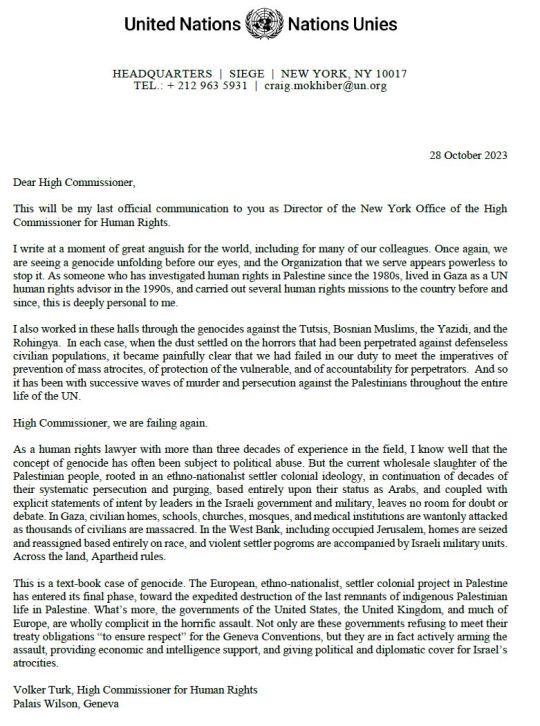
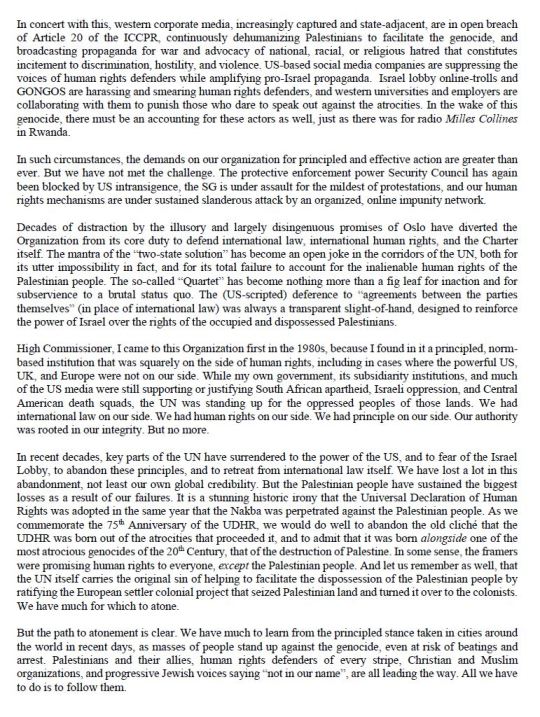
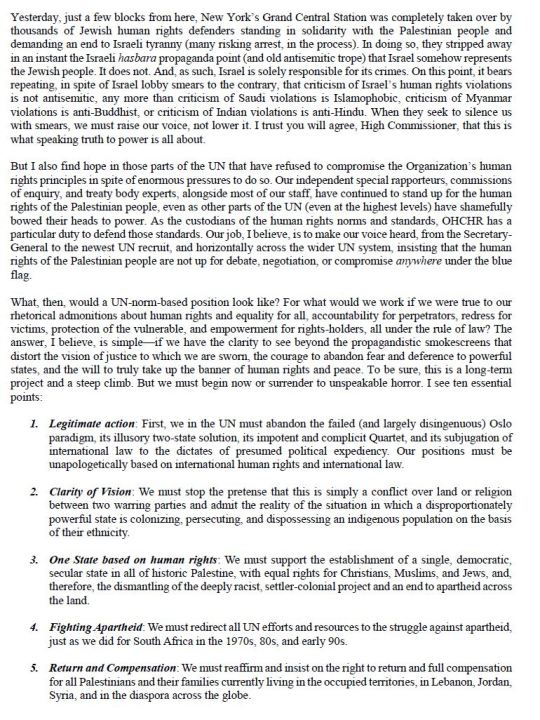
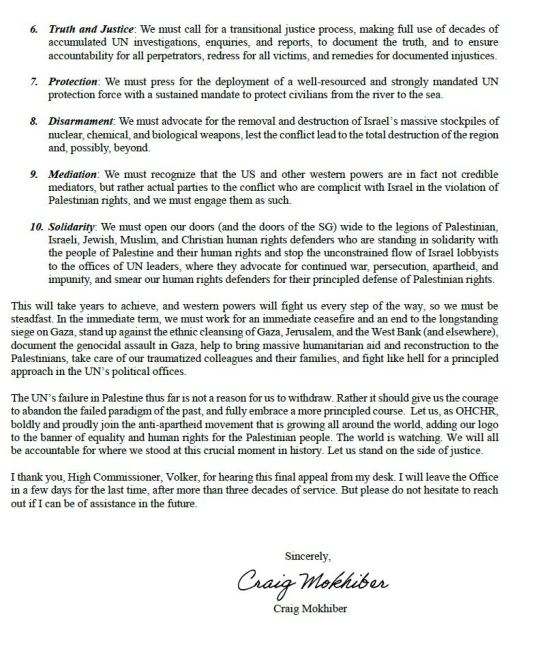
Transcription:
United Nations | Nations Unies
HEADQUARTERS I SIEGE I NEW YORK, NY 10017
28 October 2023
Dear High Commissioner,
This will be my last official communication to you as Director of the New York Office of the High Commissioner for Human Rights.
I write at a moment of great anguish for the world, including for many of our colleagues. Once again, we are seeing a genocide unfolding before our eyes, and the Organization that we serve appears powerless to stop it. As someone who has investigated human rights in Palestine since the 1980s, lived in Gaza as a UN human rights advisor in the 1990s, and carried out several human rights missions to the country before and since, this is deeply personal to me.
I also worked in these halls through the genocides against the Tutsis, Bosnian Muslims, the Yazidi, and the Rohingya. In each case, when the dust settled on the horrors that had been perpetrated against defenseless civilian populations, it became painfully clear that we had failed in our duty to meet the imperatives of prevention of mass atrocites, of protection of the vulnerable, and of accountability for perpetrators. And so it has been with successive waves of murder and persecution against the Palestinians throughout the entire life of the UN.
High Commissioner, we are failing again.
As a human rights lawyer with more than three decades of experience in the field, I know well that the concept of genocide has often been subject to political abuse. But the current wholesale slaughter of the Palestinian people, rooted in an ethno-nationalist settler colonial ideology, in continuation of decades of their systematic persecution and purging, based entirely upon their status as Arabs, and coupled with explicit statements of intent by leaders in the Israeli government and military, leaves no room for doubt or debate. In Gaza, civilian homes, schools, churches, mosques, and medical institutions are wantonly attacked as thousands of civilians are massacred. In the West Bank, including occupied Jerusalem, homes are seized and reassigned based entirely on race, and violent settler pogroms are accompanied by Israeli military units. Across the land, Apartheid rules.
This is a text-book case of genocide. The European, ethno-nationalist, settler colonial project in Palestine has entered its final phase, toward the expedited destruction of the last remnants of indigenous Palestinian life in Palestine. What's more, the governments of the United States, the United Kingdom, and much of Europe, are wholly complicit in the horrific assault. Not only are these governments refusing to meet their treaty obligations "to ensure respect" for the Geneva Conventions, but they are in fact actively arming the assault, providing economic and intelligence support, and giving political and diplomatic cover for Israel's atrocities.
Volker Turk, High Commissioner for Human Rights Palais Wilson, Geneva
In concert with this, western corporate media, increasingly captured and state-adjacent, are in open breach of Article 20 of the ICCPR, continuously dehumanizing Palestinians to facilitate the genocide, and broadcasting propaganda for war and advocacy of national, racial, or religious hatred that constitutes incitement to discrimination, hostility, and violence. US-based social media companies are suppressing the voices of human rights defenders while amplifying pro-Israel propaganda. Israel lobby online-trolls and GONGOS are harassing and smearing human rights defenders, and western universities and employers are collaborating with them to punish those who dare to speak out against the atrocities. In the wake of this genocide, there must be an accounting for these actors as well, just as there was for radio Mules Collins in Rwanda.
In such circumstances, the demands on our organization for principled and effective action are greater than ever. But we phave not met the challenge. The protective enforcement power Security Council has again been blocked by US intransigence, the SG [UN Secretary General] is under assault for the mildest of protestations, and our human rights mechanisms are under sustained slanderous attack by an organized, online impunity network.
Decades of distraction by the illusory and largely disingenuous promises of Oslo have diverted the Organization from its core duty to defend international law, international human rights, and the Charter itself. The mantra of the "two-state solution" has become an open joke in the corridors of the UN, both for its utter impossibility in fact, and for its total failure to account for the inalienable human rights of the Palestinian people. The so-called "Quartet" has become nothing more than a fig leaf for inaction and for subservience to a brutal status quo. The (US-scripted) deference to "agreements between the parties themselves" (in place of international law) was always a transparent slight-of-hand, designed to reinforce the power of Israel over the rights of the occupied and dispossessed Palestinians.
High Commissioner, I came to this Organization first in the 1980s, because I found in it a principled, norm-based institution that was squarely on the side of human rights, including in cases where the powerful US, UK, and Europe were not on our side. While my own government, its subsidiarity institutions, and much of the US media were still supporting or justifying South African apartheid, Israeli oppression, and Central American death squads, the UN was standing up for the oppressed peoples of those lands. We had international law on our side. We had human rights on our side. We had principle on our side. Our authority was rooted in our integrity. But no more.
In recent decades, key parts of the UN have surrendered to the power of the US, and to fear of the Israel Lobby, to abandon these principles, and to retreat from international law itself. We have lost a lot in this abandonment, not least our own global credibility. But the Palestinian people have sustained the biggest losses as a result of our failures. It is a stunning historic irony that the Universal Declaration of Human Rights was adopted in the same year that the Nakba was perpetrated against the Palestinian people. As we commemorate the 75th Anniversary of the UDHR, we would do well to abandon the old cliché that the UDHR was born out of the atrocities that proceeded it, and to admit that it was born alongside one of the most atrocious genocides of the 20th Century, that of the destruction of Palestine. In some sense, the framers were promising human rights to everyone, except the Palestinian people. And let us remember as well, that the UN itself carries the original sin of helping to facilitate the dispossession of the Palestinian people by ratifying the European settler colonial project that seized Palestinian land and turned it over to the colonists. We have much for which to atone.
But the path to atonement is clear. We have much to learn from the principled stance taken in cities around the world in recent days, as masses of people stand up against the genocide, even at risk of beatings and arrest. Palestinians and their allies, human rights defenders of every stripe, Christian and Muslim organizations, and progressive Jewish voices saying "not in our name", are all leading the way. All we have to do is to follow them.
Yesterday, just a few blocks from here, New York's Grand Central Station was completely taken over by thousands of Jewish human rights defenders standing in solidarity with the Palestinian people and demanding an end to Israeli tyranny (many risking arrest, in the process). In doing so, they stripped away in an instant the Israeli hasbara propaganda point (and old antisemitic trope) that Israel somehow represents the Jewish people. It does not. And, as such, Israel is solely responsible for its crimes. On this point, it bears repeating, in spite of Israel lobby smears to the contrary, that criticism of Israel's human rights violations is not antisemitic, any more than criticism of Saudi violations is Islamophobic, criticism of Myanmar violations is anti-Buddhist, or criticism of Indian violations is anti-Hindu. When they seek to silence us with smears, we must raise our voice, not lower it. I trust you will agree, High Commissioner, that this is what speaking truth to power is all about.
But I also find hope in those parts of the UN that have refused to compromise the Organization's human rights principles in spite of enormous pressures to do so. Our independent special rapporteurs, commissions of enquiry, and treaty body experts, alongside most of our staff, have continued to stand up for the human rights of the Palestinian people, even as other parts of the UN (even at the highest levels) have shamefully bowed their heads to power. As the custodians of the human rights norms and standards, OHCHR. has a particular duty to defend those standards. Our job, I believe, is to make our voice heard, from the Secretary-General to the newest UN recruit, and horizontally across the wider UN system, incisting that the human rights of the Palestinian people are not up for debate, negotiation, or compromise anywhere under the blue flag.
What, then, would a UN-norm-based position look like? For what would we work if we were true to our rhetorical admonitions about human rights and equality for all, accountability for perpetrators, redress for victims, protection of the vulnerable, and empowerment for rights-holders, all under the rule of law? The answer, I believe, is simple—if we have the clarity to see beyond the propagandistic smokescreens that distort the vision of justice to which we are sworn, the courage to abandon fear and deference to powerful states, and the will to truly take up the banner of human rights and peace. To be sure, this is a long-term project and a steep climb. But we must begin now or surrender to unspeakable horror. I see ten essential points:
Legitimate action: First, we in the UN must abandon the failed (and largely disingenuous) Oslo paradigm, its illusory two-state solution, its impotent and complicit Quartet, and its subjugation of international law to the dictates of presumed political expediency. Our positions must be unapologetically based on international human rights and international law.
Clarity of Vision: We must stop the pretense that this is simply a conflict over land or religion between two warring parties and admit the reality of the situation in which a disproportionately powerful state is colonizing, persecuting, and dispossessing an indigenous population on the basis of their ethnicity.
One State based on human rights: We must support the establishment of a single, democratic, secular state in all of historic Palestine, with equal rights for Christians, Muslims, and Jews, and, therefore, the dicmantling of the deeply racist, settler-colonial project and an end to apartheid across the land.
Fighting Apartheid: We must redirect all UN efforts and resources to the struggle against apartheid, just as we did for South Africa in the 1970s, 80s, and early 90s.
Return and Compensation: We must reaffirm and insist on the right to return and full compensation for all Palestinians and their families currently living in the occupied territories, in Lebanon, Jordan, Syria, and in the diaspora across the globe.
Truth and Justice: We must call for a transitional justice process, making full use of decades of accumulated UN investigations, enquiries, and reports, to document the truth, and to ensure accountability for all perpetrators, redress for all victims, and remedies for documented injustices.
Protection: We must press for the deployment of a well-resourced and strongly mandated UN protection force with a sustained mandate to protect civilians from the river to the sea.
Disarmament: We must advocate for the removal and destruction of Israel's massive stockpiles of nuclear, chemical, and biological weapons, lest the conflict lead to the total destruction of the region and, possibly, beyond.
Mediation: We must recognize that the US and other western powers are in fact not credible mediators, but rather actual parties to the conflict who are complicit with Israel in the violation of Palestinian rights, and we must engage them as such.
Solidarity: We must open our doors (and the doors of the SG) wide to the legions of Palestinian, Israeli, Jewish, Muslim, and Christian human rights defenders who are standing in solidarity with the people of Palestine and their human rights and stop the unconstrained flow of Israel lobbyists to the offices of UN leaders, where they advocate for continued war, persecution, apartheid, and impunity, and smear our human rights defenders for their principled defense of Palestinian rights.
This will take years to achieve, and western powers will fight us every step of the way, so we must be steadfast. In the immediate term, we must work for an immediate ceasefire and an end to the longstanding siege on Gaza, stand up against the ethnic cleansing of Gaza, Jerusalem, and the West Bank (and elsewhere), document the genocidal assault in Gaza, help to bring massive humanitarian aid and reconstruction to the Palestinians, take care of our traumatized colleagues and their families, and fight like hell for a principled approach in the UN's political offices.
The UN's failure in Palestine thus far is not a reason for us to withdraw. Rather it should give us the courage to abandon the failed paradigm of the past, and fully embrace a more principled course. Let us, as OHCHR, boldly and proudly join the anti-apartheid movement that is growing all around the world, adding our logo to the banner of equality and human rights for the Palestinian people. The world is watching. We will all be accountable for where we stood at this crucial moment in history. Let us stand on the side of justice.
I thank you, High Commissioner, Volker, for hearing this final appeal from my desk. I will leave the Office in a few days for the last time, after more than three decades of service. But please do not hesitate to reach out if I can be of assistance in the future.
Sincerely,
Craig Mokhiber
End of transcription.
Emphasis (bolding) is my own. I have added links, where relevant, to explanations of concepts the former Director refers to.
#Israel#Palestine#October 2023#28 October 2023#United Nations#Described#Long post#I’ll add more links to the things he is talking about later
15K notes
·
View notes
Text
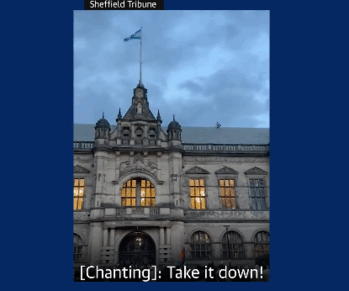

October 10, 2023 - During a protest in solidarity with the Palestinian people in Sheffield, UK, two people scaled the 60-meter tall town hall to take down the Israeli flag that the local council had raised over hte building. In its stead they raised the flag of Palestine, to cheers from the crowd. [video]/[video]
#sheffield#solidarity#free palestine#palestine#resistance#flag#israeli flag#take down#propaganda#gif#2023#uk#britain#england#anti-colonialism#apartheid#flag waving#israel
7K notes
·
View notes
Text
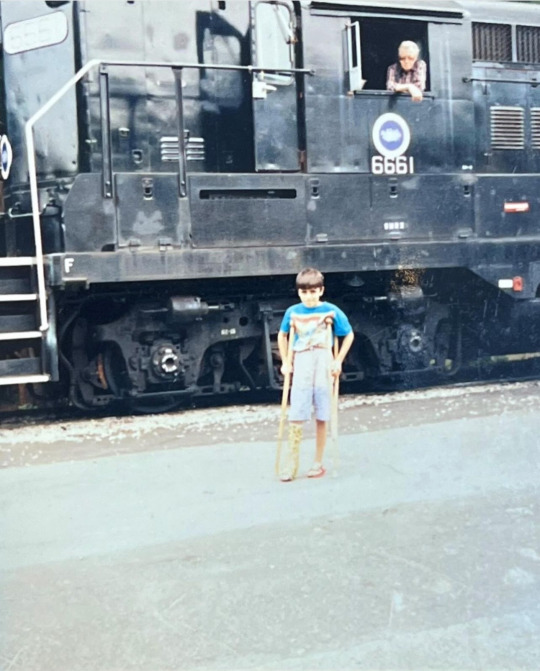
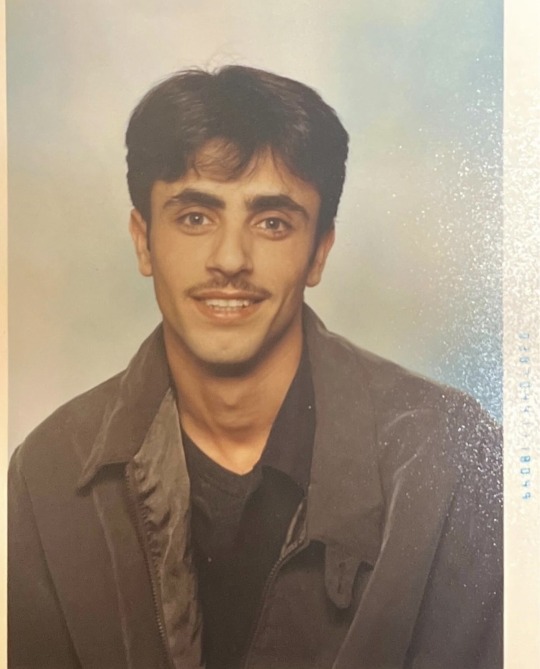
Suha writes: when my sister was little, she used to pronounce amu (uncle) as abo and my uncle muneer thought it was the cutest thing ever. so it stuck and it was our collective nickname. we'd yell abo when we saw him and he'd yell back abo before we raced to each other's arms.
abo was the spoiled baby brother of nine. his father died when he was a year old. when he was 8 years old, the zionist army shot him in the leg twice. he was one of the first children brought to the united states through @thepcrf to receive treatment, but he was never able to play soccer like the rest of the kids again. he lived with us for a while in the states before moving back permanently to gaza. his favorite movie of all time was blue streak and until the last time i saw him he would say "what you gonna do with one shoelace?" and i'd respond with "floss your ass?" we'd then spend the next 10 minutes quoting and laughing at his favorite lines. he'd always rent a fancy car and sneak us away from the crowded family home to take us to the newest popular shawarma and knafa joints in gaza city. i remember during one of those getaways he told me that my dad was not only his brother, but his father. he swore he would name his son after my father in accordance with our tradition of naming one's firstborn son after their father. and he did.
today, abo was executed right before his mother's eyes by the merciless zionist army. the soldiers raided our family home and forced themselves into my grandmother's bedroom. she said he was trying to explain to the soldiers that she was his mother and no one was there when they suddenly and ruthlessly shot him in the neck. he exhaled a faint "يما" (mama) before collapsing to the ground. and that was it. he's gone.
my devastated and heart shattered grandmother was not even given a chance to say goodbye. she begged them to let her take her son's body with her. instead they expelled her from her house and forced her to leave her baby boy's precious body behind. then they abducted her two other sons and her grandchildren.
#when i tell you my heart is broken....#the last paragraph can be taken from 1948 or 2023 and you wouldn't know the difference#palestine#gaza#israel
5K notes
·
View notes
Text
Please share because alot of people think this is a War it’s not
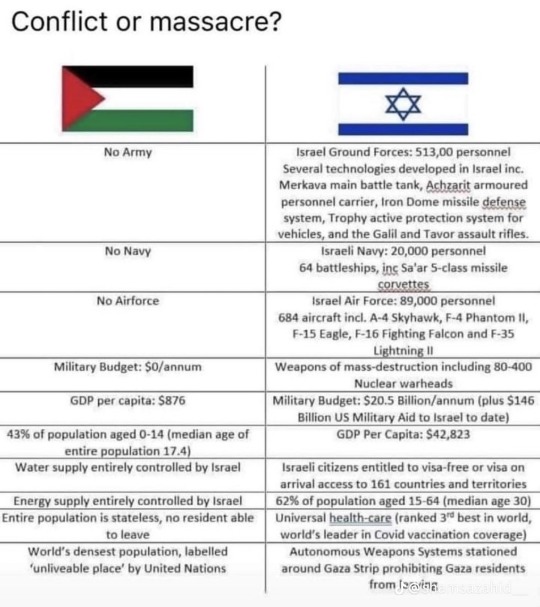
#free palestine#pro palestine#donate to palestine#gaza#help gaza#israel#Israeli state#this is not a war#uk against genocide#lgbtqia against genocide#Palestinians#Palestinians are people#humanity#human rights#Gaza 2023#Gaza trapped
5K notes
·
View notes
Text
Israel continues its genocide of innocent children in Gaza as its aggression on the territory marks 67 days.
Quds News Network Telegram
#free palestine#protest#2023#gazaunderattack#please help#december#gaza#boycott israel#isreal is a terrorist state#isreal is a terrorist#from the river to the sea palestine will be free
2K notes
·
View notes
Text
Hunger Or Bombs

Palestinians in Gaza are given a stark choice.
“I’ll Give You 2 Options: Hinger Or Bombs!”
Artist: Carlos Latuff
#gaza#palestinians#free palestine#palestine#islamophobia#islam#art#israel#free gaza#gaza strip#gaza genocide#gazaunderattack#palestine genocide#gaza under attack#gaza news#gaza war#gazan genocide#gaza now#gazan families#gazanation#genocide#ethnic cleansing#anti zionisim#west bank#israeli occupation#nakba#nakba 2023#al nakba#second nakba#nakba 1948
1K notes
·
View notes
Text
Palestinian freedom fighters breaking out of Gaza and reclaiming their occupied territories. They’ve taken over israeli tanks and have chased out the settlers that were on that land. They’ve launched rockets everywhere and the iron dome has failed to intercept. This is about to mark a momentous event in history.
From the river to the sea, Palestine will be free.
#free palestine#it feels so surreal and so shocking#there’s so much hope but so much fear#you just know they’re about to retaliate with the genocide they’ve been planning for years now#i fear for my palestinian brothers and sisters but this is so fucking huge#they tore down part of the barbed wire fence!!!! the people of Gaza are breaking out!!!!#god there’s so much more on twitter but i beg if you look do NOT look at non-palestinian sources#they’re twisting the narrative as if this isn’t retaliation for 76 years of torture#as if the israeli forces and settlers didn’t kill 4 palestinians yesterday alone#as if they haven’t killed nearly 300 palestinians this year alone#do NOT let the media trick you into thinking anything after will be a retaliation to an attack Palestine started#PALESTINE is the one retaliating#also if you’re gonna come in here with both sides or whatever sincerely block me and lmk so i can blokc you#they’ve already out out statements to leave children and the elderly alone so any middle aged fuckers are free to kill :)#which is fine since they’ve likely killed hundreds if not thousands of their friends and family and neighbors anyway#tag: important#fuck israel#gaza#tag: october 7 2023
2K notes
·
View notes
Text
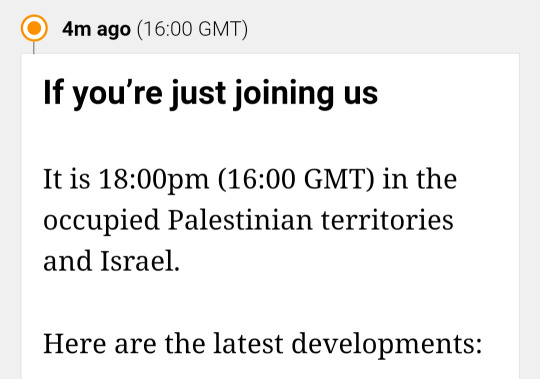
World Food Programme, UNICEF and the World Health Organization said that new entry routes need to be opened to Gaza or its population will suffer widespread famine and disease.
The European Union has added Hamas leader Yahya Sinwar to its “terrorist” sanctions blacklist over the October 7 attacks on Israel.
The US Central Command (CENTCOM) has confirmed that it seized what it claims to be alleged Iranian missile components sent to the Houthis in Yemen last week.
The UK is continuing to export weapons to Israel, alleging Israel’s commitment to complying with international law despite legal action brought forward by two human rights organisations.
Israeli far-right National Security Minister Itamar Ben-Gvir has sharply criticised the withdrawal of the military’s 36th Division from the Gaza Strip, describing the decision as ‘grave and dangerous mistake’.
2K notes
·
View notes
Text
honestly you must be a special kind of sick and evil to support israel. they bombed a fucking hospital. a hospital. how psychopathic, privileged, and ignorant do you have to be to support them. y’all make me sick. I want to grab your faces and force you to watch what’s happening.
#im fucking seething#im seeing red#no one fucking even mention israel to mr#palestine#free palestine#gaza#gaza under attack#gaza 2023#palestine 2023#from the river to the sea palestine will be free#im so utterly disgusted#any white person wanting to have a say about this i invite you to royally shut the fucking fuck up
1K notes
·
View notes
Note
Tourists get to enter Palestine, lounge on our beaches, live on our land, eat our food, and explore our (stolen) art, style, and culture. But refugee Palestinians who were kicked out of their homes, Palestinians who left because they didn’t want their children to live under apartheid, Palestinians whose only options were to flee or get massacred, they barely ever get to enter their homeland again. Most are never allowed to even go back.
How is that fair ? That other people get to enter OUR country, live on OUR land, share OUR culture, but WE were never given the chance to ? How can people just sit by and watch this happen without feeling disgust and pain in their heart for not even speaking up about it ? The least anyone could do is just speak up.
I recently watched a TikTok that explains through a pseudo-satrical marketing lens how propaganda and white culture/professionalism manages to convince people to not care or stay "neutral" in events like this by @saffana | how to write copy, subtitled"marketing a Jenner Syde":
She breaks it down pretty well. Better than I could.
Of course, there is the usual colonial powers that already govern American and EU politics making Arabs and Muslims BOTH the same group and making them the "natural" terrorists and enemies of those colonial "good guy, democratic" states. This gets perpetuated and strengthened by what the user above describes happens a lot in Western media taking advantage of the present apathy and white hegemonic ways of thinking about community and individualism.
It's not fair. Not at all. It's actually evil at the core.
#not asoiaf#tiktok#us imperialism#palestinian genocide 2023#israel and palestine 2023#palestine#free palestine
10 notes
·
View notes
Text
Insane Freudian slip right there. gg
834 notes
·
View notes
Text
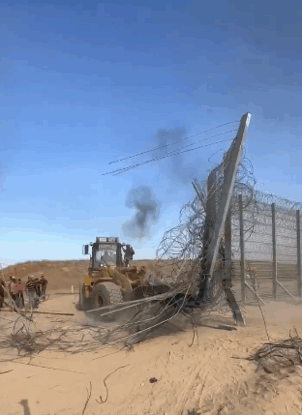
October 7, 2023 - Palestinians tear down part of the apartheids-wall around Gaza at the start of their attack against the Israeli occupation. [video]
#free palestine#palestine#apartheid#occupation#resistance#israel#anti colonialism#gif#2023#war#gaza#liberation#bulldozer#border#no borders
5K notes
·
View notes
Text
23 years ago 9/11 happened, I wasn't even half a year old at that time, yet it affected me in several ways, I'm brown, middle eastern, Muslim, Arabic speaker & so on, I think you get the picture.
After 9/11 happened, Muslims & Arabs/middle easterns were viewed as terrorists, hate crimes increased too, Muslims were viewed as barbaric people, savages, couldn't integrate & so on.
How did that affect us?
You can't wear hijab in France for example, you can't speak in Arabic on the bus in England without someone calling you out for being a terrorist cause now you're on English lands, you better speak their language, you could get killed in the US cause there's no gun control whatsoever.
Hate spreads like wildfire & so it did against Arabs, middle easterns, Muslims & the Arabic language.
Why am I saying all that?
Because the IDF & Israel today tried to use the buried fear of the Arabic language & the ignorance of the west about it to their own appeal:
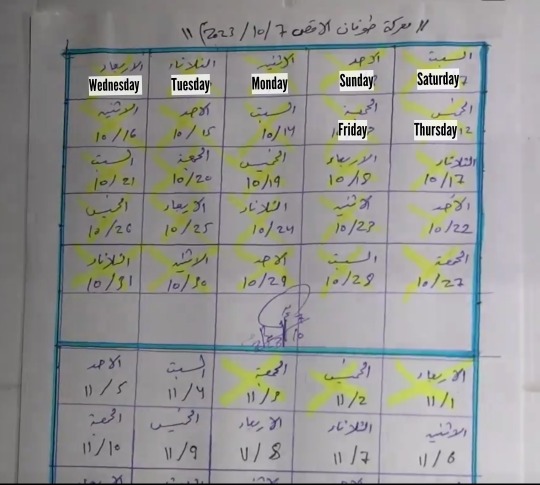
This is a freaking calendar but to some who are already scared of the language, that's enough terrorism.
People all over social media here in the East are making fun of that stupid little stunt but for me it depends inherently on the racism, islamophobia & fear of Arabic that has been fed to the west for decades. It's literally another racist move against Arabic speakers but it's Israel so I'm not surprised.
#palestine#israel#israel is a terrorist state#gaza#genocide#free palestine#ethnic cleansing#israel is an apartheid state#this is where the american taxes go#arabic#middle east#the west#calendar#2023 calendar#islam#islamophobia
917 notes
·
View notes
Text
ok, you little shit heads, the fact that the Palestinian live under horrible conditions is not an excuse for the mass kidnapping and targeting civilians.
Two wrongs don't make a right.
and it goes both ways, the assault that has been perpetuated against Israeli citizens does not make the suffering of Palestinian civilians justified.
so, you little shit, practice your fucking humanity and allow the horrors exist without comparing or justifying them!
#jumblr#israel#ישראבלר#palestine#ישראל#טאמבלר ישראלי#7/10/2023#חרבות ברזל#I swear the fuck#this is not a competition#we are just getting covered with more and more shit#between both sides we have around 400 confirmed dead#and when they will be put down#there will be zero meaning to “who had it worse”#they are dead#pull your heads out of your arses and fucking TALK!
786 notes
·
View notes
